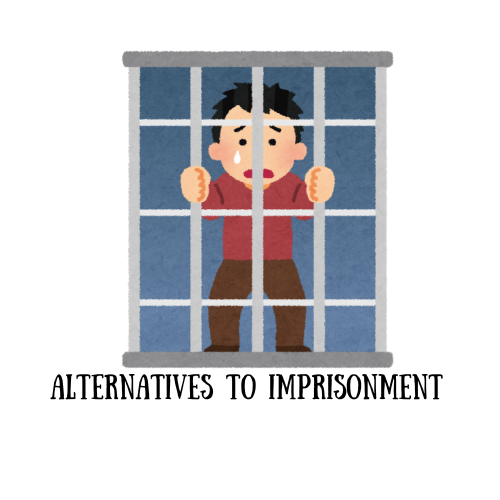ALTERNATIVES TO IMPRISONMENT
ALTERNATIVES TO IMPRISONMENT
Welcome to Law Adhoc Tutorials !
These notes are in easy language and easy to remember.
Law Adhoc Tutorials is an education platform. It helps law students get high quality notes to make their study easier. Law Adhoc Tutorials provides full and completes notes for free for each subjects of law.
ALTERNATIVES TO IMPRISONMENT
ALTERNATIVES TO IMPRISONMENT
ALTERNATIVES TO IMPRISONMENT
In India, alternatives to imprisonment are available at all the three stages: pre-trial, sentencing and post sentencing stage with varying degrees of success in different states.
PRE-TRIAL STAGE:
Bail
Bail is a common alternative to pre-trial detention. The Indian Penal Code of 1860 classifies offenses and their punishments but needs revision as it is over a century old. The right to bail is crucial for the accused, as emphasized by the Supreme Court of India’s principle of “bail, not jail.” The court sets the bail amount, which can be forfeited if the defendant does not appear for trial. On average, undertrial prisoners are held for about 1 to 2 years.
Imposing time limits on Pre-Trial Detention
The right to a speedy trial is a fundamental right under Article 21 of the Constitution of India, ensuring life and personal liberty. The Supreme Court has emphasized this right, which includes all stages of legal proceedings: investigation, inquiry, trial, appeal, revision, and retrial. Criminal Courts have powers under sections 309, 311, and 258 of the Code of Criminal Procedure, 1973, to facilitate this right. However, many individuals face lengthy remand periods, often exceeding the time they would serve if convicted, indicating a need for judicial reforms.
Plea Bargaining
The plea bargaining system was introduced by the Code of Criminal Procedure (Amendment) Act, 2005, effective from July 2006. It comprises Sections 265A to 265L of the Criminal Procedure Code, allowing plea bargaining in criminal cases with a maximum punishment of up to seven years, but excluding cases involving women and children. This amendment aims to benefit around 50,000 undertrial prisoners and reduce case backlogs in trial courts, addressing overcrowding in prisons.
Free Legal Aid
Everyone arrested or accused of a crime has the right to a fair trial, which includes the right to a speedy trial and free legal aid, as upheld by the Supreme Court of India. The Legal Services Authorities Act, 1987 ensures that weaker sections receive competent legal services to secure justice without economic barriers.
Diversion:
Diversion means removing someone from the criminal justice process and connecting them to community support services. This helps prevent stigma in future legal proceedings. In India, village Panchayats handle minor criminal cases outside of court. They can drop minor charges and issue police cautions as needed.
Administrative fines / non penal fines:
In most of the countries, including India, the traffic law and other special laws allow the law enforcing agencies to impose administrative fines in certain cases for easing the burden on prosecution. Judicious use of these provisions shall certainly
impact overall size of prison population in the country.
Sentencing Stage
Fine and other monetary penalties:
Fines are given for minor offenses before trial to help reduce pre-trial detention. They are cost-effective and humane, causing minimal harm to offenders. However, fines don’t work for those who can’t afford to pay, leading some to go to prison for non-payment. In these cases, community service is a better alternative to imprisonment.
Admonition / Absolute discharge / Conditional discharge:
Sections 360 and 361 of the Cr.P.C, 1973, provide for admonition in juvenile cases, particularly for first-time offenders facing imprisonment for less than two years. Courts can release these offenders after admonition for specified offenses. A conditional discharge may also be imposed, requiring them to avoid further offenses during a designated period. By using this provision wisely, courts can reduce the need for imprisonment, focusing more on rehabilitation for juvenile offenders.
Compensation:
Sections 357 to 359 of the Cr.P.C, 1973, allow courts to order offenders to pay reasonable compensation for any loss or injury caused by their offenses. This compensation is imposed alongside other sentences, rather than as an alternative to short-term imprisonment, highlighting the offender’s responsibility to rectify the harm done while maintaining accountability.
Probation:
Probation is an effective non-custodial measure that promotes the early reformation and re-socialization of offenders within their communities. By imposing certain conditions for compliance, it focuses on rehabilitation rather than punishment, helping individuals reintegrate and develop positive behaviors while under supervision.
POST SENTENCING STAGE
Parole
Parole allows for the conditional release of an offender from prison before their sentence is completed. This temporary release helps individuals attend to personal matters, like agricultural duties or urgent family needs.
Pardon
In India, pardons are granted by the Head of State—either the President or the Governor—according to Articles 72 and 161 of the Constitution, as offenses are considered committed against the State. Victims do not have the authority to grant pardons. State Governments may also commute sentences during special occasions, which helps reduce the prison population. The Supreme Court is reviewing the process to clarify the grounds for granting pardons.
Remission of Sentence:
In India, remission for prisoners can be granted by the State Government and prison authorities as an incentive for good behavior and discipline. The three types of remission are ordinary, special, and state government remission.
Temporary Release Mechanisms
In India, temporarily released prisoners serve part of their sentence outside prison and include options like work release and furlough. Furlough allows inmates to visit family after serving a portion of their sentence and is counted as time served. In contrast, parole is a suspension of the sentence. Furlough is usually granted for good conduct but not for those involved in serious offences.
Open Prisons
Not all prisoners are dangerous criminals; many who have committed serious offenses may not be a threat. India has 26 open prisons with a capacity of 4,353 inmates, and their development varies by state. Prisoners serving life sentences can be transferred to open prisons for good conduct.
Open prisons aim to restore individual dignity and foster self-confidence and responsibility. Their positive effects include:
– Reducing harm to offenders and society
– Alleviating prison overcrowding
– Lowering costs for the state compared to traditional jails
– Encouraging social responsibility toward families and society
ALTERNATIVES TO IMPRISONMENT
Penology and Victimology Notes : https://lawadhoctutorials.com/penology-and-victimology-notes/
Penology and Victimology Notes PDF : https://lawadhoctutorials.com/penology-and-victimology-notes-pdf/
ALTERNATIVES TO IMPRISONMENT
Education of Prisoners Notes : https://lawadhoctutorials.com/education-of-prisoners/
Vocational Training for Prisoners notes : https://lawadhoctutorials.com/vocational-training-for-prisoners-in-india/
ALTERNATIVES TO IMPRISONMENT
Rights and Duties of Prisoners notes :- https://lawadhoctutorials.com/rights-and-duties-of-prisoners/
Model Prison Act Notes : https://lawadhoctutorials.com/model-prisons-act-2003/
ALTERNATIVES TO IMPRISONMENT
All subjects law notes : https://lawadhoctutorials.com/subject/
All subjects law notes in pdf : https://lawadhoctutorials.com/notespdf/
ALTERNATIVES TO IMPRISONMENT
Law of torts lecture link on YouTube: https://youtu.be/fRx-i5fk3jo?si=QPnyduoa3IeZoI5W
Free and easy to access law notes. The law notes are available for all law subjects. Please check the below-mentioned list for complete law notes.
ALTERNATIVES TO IMPRISONMENT
Click on the specific subject to view its notes.



